CRUISE SHIP BLOGS
RICK STICKNEY
Rick Stickney Cruise Ship Blog - Tasty Guitar
DAVID COLA
Life as a Cruise Ship Musician 1
Life as a Cruise Ship Musician 2
RYAN GARMOE
Life On A Cruise Ship - Everyday Living

I’m frequently asked about my life as a cruise ship musician. It is not such a rare job in my usual circles, but some of my friends outside of the jazz community didn't even know working a cruise ship was possible. Even my girlfriend, whom I talk with more than anyone and has a music degree, isn’t always clear about "what I do". Given this, I have decided to write a series of posts about my life as a living and playing music on cruise ship. I’ll try to touch on the big topics people have generally been curious about, such as everyday living, the music, extensive traveling, and how I got the job in the first place. This first post will be about the general experience of living on a cruise ship.
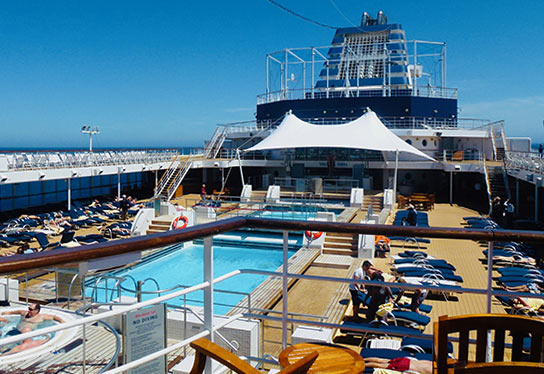 If there is a trend in people’s reactions when they hear about my job, it is towards glorification. I’m happy people are interested in what I do, but through these posts I would also like to clarify and bring attention to some aspects of working on a cruise ship that some initially exaggerate or don’t consider. Sometimes, people's curiosity is unknowingly matched by their misunderstanding.
If there is a trend in people’s reactions when they hear about my job, it is towards glorification. I’m happy people are interested in what I do, but through these posts I would also like to clarify and bring attention to some aspects of working on a cruise ship that some initially exaggerate or don’t consider. Sometimes, people's curiosity is unknowingly matched by their misunderstanding.
I think the best way to describe a cruise ship is as a giant floating hotel. Not like a Holiday Inn hotel, but a fancy boutique, "you don’t have to worry about anything when you step through the doors hotel”. Once onboard our giant floating hotel, guests can enjoy a variety fancy of hotel-ish amenities. The big hitters are multiple high end restaurants, extensive entertainment options, a comprehensive spa, a full casino, and an open air pool and hot tub complex. And those are just the big ones. Naturally, there are scores of people behind the scenes helping each of these amenities run smoothly. Much like a hotel, a guest will never see most of this activity. That’s how it supposed to be. However, behind and below those ‘staff only’ doors is a completely different and wholly fascinating world.
Some crew members work exclusively in guest areas and some in crew areas. As a musician I work exclusively in the guest areas, while an engineer or galley cook might only work in crew areas. This brings up another important distinction of Hotel versus Deck and Engine. Hotel work is mostly concerned with the guests and their experience, such as dining, entertainment (me), housekeeping, bar staff, etc. Deck and Engine on the other hand is concerned with the actual running of the ship. That includes navigation, engine maintenance, environmental affairs, repairman and plumbers, among others.
Of course there is some crossover, but that general division applies to most of the ship.
On my current boat there are about 550 crew members from 45ish different countries. The exact numbers are always changing. It’s not uncommon to walk into our crew bar at night and hear 4 or 5 different languages happening at once. The official language of the ship is English, but Spanish, Russian, Filipino dialects, Chinese, and Indian dialects are all popular as well. For reference, I am one of maybe 5 or 6 Americans. Most crew come from Southeast Asia, specifically the Philippines or India. There are also large contingencies of Russians, Ukrainians, Colombians, and South Africans.
 9 times out of 10, the onboard food is the first thing people ask me about. A typical interaction might start with the person giving me a dramatic hand on the shoulder or roll of the eyes saying, “I bet the food is SOO good”. It is if you pay for it! And by pay for I mean you pay for a cabin and are a guest. Yes, dining is one of main features of a cruise ship, but it is mostly reserved for those who shell out the money. Sometimes food will trickle down to one of our messes (cafeterias) from a big event such as the ‘Seafood Extravaganza” or the ‘Grand Deck Barbecue’, but that can't be consistently relied upon.
9 times out of 10, the onboard food is the first thing people ask me about. A typical interaction might start with the person giving me a dramatic hand on the shoulder or roll of the eyes saying, “I bet the food is SOO good”. It is if you pay for it! And by pay for I mean you pay for a cabin and are a guest. Yes, dining is one of main features of a cruise ship, but it is mostly reserved for those who shell out the money. Sometimes food will trickle down to one of our messes (cafeterias) from a big event such as the ‘Seafood Extravaganza” or the ‘Grand Deck Barbecue’, but that can't be consistently relied upon.
The quality of the food for crew is generally good, but not amazing. People are usually a bit shocked when I tell them this, but there are more factors in play. First off, food onboard for crew is free. It is possible that a crew member not spend any money on food for the duration of their contract. Of course items like beer, candy, and other snacks cost extra, but even those are highly discounted. Our messes are served buffet style 3 times a day, so one could theoretically eat as much as they wanted for no cost every single meal. Even though the selection and quality sometimes leaves something to be desired, it’s still a pretty good deal overall.
A second factor to consider is the amount of food that the ship is required to produce. Especially on my current ship, which for guests is all inclusive and offers multiple buffet style venues, there is a massive demand for high quality food at all times of day. It is understandable then, that the food for crew isn’t up to the same quality as the stuff that gets served in the guest restaurants. Guestrants..? Oof. It just makes sense given the amount of food necessary each day and the extremely tight time frame in which the galley crews have to operate. One final factor regarding food, which I only recently considered, ties back in to the diversity of the crew.
In our messes there is usually a decent variety of options, but I'm always surprised at the various Asian dishes, specifically those that are fish based. I connected the dots that since most of the crew is from Southeast Asia, it would make sense that the majority of the food is from that part of the world. Duh. Furthermore, as most cruise ship workers come from areas by the sea, it also makes sense that fish be an important part of their diets. Many crew members enjoy seafood very much, taking some almost at every meal. I on other hand, having not grown up with copious of seafood, tend to only gravitate towards it when there is something I feel strongly for. That could all be conjecture, but it makes sense to me.
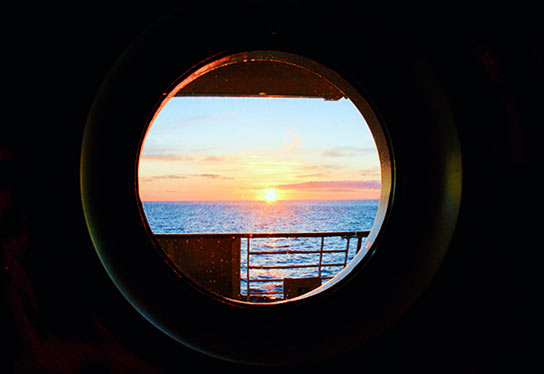 The other thing I’m frequently asked about are my sleeping accommodations. On our 14 deck boat, there are 2 main decks dedicated for crew living, which are decks 2 and 3. Deck 1 is all engine, while everything else is essentially for guests. Crew generally live two to a room, but on bigger ships there might even be four to a room. If you are of high enough position, you can get the coveted single cabin, which might be on deck 3 or even higher, again depending on your position.
The other thing I’m frequently asked about are my sleeping accommodations. On our 14 deck boat, there are 2 main decks dedicated for crew living, which are decks 2 and 3. Deck 1 is all engine, while everything else is essentially for guests. Crew generally live two to a room, but on bigger ships there might even be four to a room. If you are of high enough position, you can get the coveted single cabin, which might be on deck 3 or even higher, again depending on your position.
I live on deck 3 in a double cabin with our guitar player, Andrii. The orchestra musicians all live in the same hallway, which is for pivotal for communication and beer drinking. My double room features bunks beds, 2 sizable desks, 2 chairs, 2 closets, a mini fridge, various hooks for hanging stuff, and 1 tiny tiny bathroom. If pressured for specific measurements, I would say my room is about 8 feet across and 15 deep. I know it sounds small, but the rooms are designed to maximize space and are actually more comfortable than you might think! It’s just a matter of getting used to the situation. But... About the bathroom. It’s very tiny. It is about 7 feet high and not including the depth of the shower, maybe 4-5 feet at it’s widest. Also, I can’t do a 360 in the shower without running into something or stepping out. Also, also, no matter where I put my clothes for after my shower, they inevitably get wet. Also, Also, Also, Sometimes your shower drain will clog and then the entirety of your bathroom is flooded until a plumber can get down to your cabin. Not that I would know from experience or anything...
People complain about the bathrooms.
The crew laundry machines are usually of quality, but lacking in quantity. I think there are 4 washers and dryers for our 550 member crew. It is not uncommon to wait a few hours or even all day to get access to a laundry machine. That being said, it is possible to get your laundry done by the crew dry cleaning, but it costs money depending on what you want to have dry cleaned or again, your status. Everyone does gets their work uniforms dry cleaned for free, however.
Other amenities for the crew include a gym, spa access, an open air area on deck 14, ping pong, foosball, discounts at the boutique, and the ever infamous crew bar. At crew bar, beer is $1.00 and a shot of liquor is $2.00. Thankfully, most people don’t take full advantage of that on a nightly basis but it's there if you want it. Crew bar is one of the equalizers on the boat- you can walk in, meet and talk with some new people, share a drink with your supervisor, and in general BS around with your co-workers. It's the most popular evening hang for those looking to socialize and have some fun.
 One unexpected perk of my job are the highly discounted drinks I get in guest areas. As you can imagine, the drink menu on a luxury cruise ship is quite impressive. And me, being a frugal, value driven individual, have finished many nights sipping something I would have no business drinking at home. I will say since I’ve joined this ship, I’ve developed a taste for cognac, single malt whiskey, and oddly enough, tequila based cocktails. Another perk is the onboard TV and Movie service. Each cabin has a TV where you can access a Netflix-ish service with a decent amount of TV shows and an excellent variety of movies. My favorite movies I’ve watched so far are Bohemian Rhapsody, Green Book, All 3 Matrix movies, To Kill a Mockingbird, and Goodfellas.
One unexpected perk of my job are the highly discounted drinks I get in guest areas. As you can imagine, the drink menu on a luxury cruise ship is quite impressive. And me, being a frugal, value driven individual, have finished many nights sipping something I would have no business drinking at home. I will say since I’ve joined this ship, I’ve developed a taste for cognac, single malt whiskey, and oddly enough, tequila based cocktails. Another perk is the onboard TV and Movie service. Each cabin has a TV where you can access a Netflix-ish service with a decent amount of TV shows and an excellent variety of movies. My favorite movies I’ve watched so far are Bohemian Rhapsody, Green Book, All 3 Matrix movies, To Kill a Mockingbird, and Goodfellas.
Living on a cruise ship has been one of the most interesting and educational experiences of my life. It is also a different way of living than many of us are used to which requires steady adjustment. Your well being and success on the job really depend on your ability to not only adapt to the necessary changes in lifestyle, but accept and embrace them. There’s very little you can change about your circumstances on the boat. Your choices are to either be okay with them or find a different job.
I hope I answered some questions you might’ve had before reading this post. If there are any ideas that popped into your head while reading, please let me know by saying something below or sending me an email! My next post in the series will be about my actual job of playing trumpet on the ship. As always, thanks for reading and I hope you found this writing enjoyable and worthwhile. Until next time!
Life on a Cruise Ship - My Job
In the first part of my series about living and working on a cruise ship, I touched on some frequently asked questions and also brought up a few ideas people might not initially consider regarding ship life. If you would like to read that post, it is listed as 'Life on a Cruise Ship - Everyday Living' under the blog header on this website. This current post is about my job playing trumpet. The most common questions I receive about my the job aspect of my job can be boiled down to who, what, where, and why. In this post, I’ll discuss these questions as well as a few other 'work' related bits of information.
For starters, I play in a seven piece band called the ‘company that I work for Signature Orchestra’. Fancy, right? Our band has trumpet, saxophone, and trombone in the horn section, and piano, guitar, bass, and drums in the rhythm section. This is the most common instrumentation if a ship has a 7 piece ensemble. Some smaller ships may only have 5 musicians in the band, cutting the trumpet and trombone. Some of bigger ships, however, might have an 11 piece ensemble with 4 extra horn players. It really depends on how the specific boat needs the band and how many other musicians are on board. An interesting note is that the saxophone player is really more of an overall woodwind specialist. They are expected to play not only tenor and alto saxophone, but clarinet and flute as well. Their ability to cover 4+ instruments is why they get to stick around in a 5 piece band.
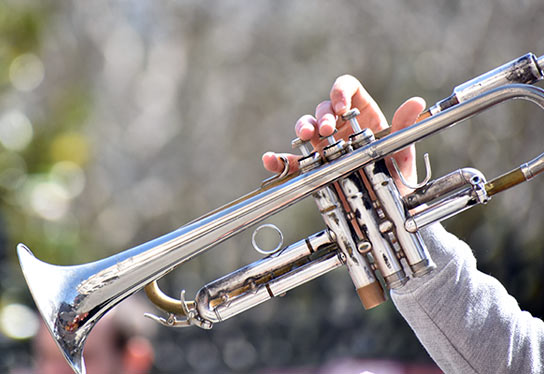 The bands on ships are a revolving door of personnel. In the first 2 months of my current contract we have had 2 different piano players, bassists, and saxophone/woodwind players. Because musicians are always coming and going, being able to quickly adapt both musically and personally, are essential skills for success. This is especially true given the diversity of the bands on cruise ships. Currently, our band has 3 Ukrainians, 2 Russians, 1 Brit, and 1 American. At the most diverse point on my previous contract, our band had 2 Ukrainians and Americans, a Columbian, Australian, and a Pole (Poland). This aspect of the job requires a certain temperament and patience given the sometimes significant language barriers, as well as different styles of communication on the bandstand and conceptions of essential repertoire.
The bands on ships are a revolving door of personnel. In the first 2 months of my current contract we have had 2 different piano players, bassists, and saxophone/woodwind players. Because musicians are always coming and going, being able to quickly adapt both musically and personally, are essential skills for success. This is especially true given the diversity of the bands on cruise ships. Currently, our band has 3 Ukrainians, 2 Russians, 1 Brit, and 1 American. At the most diverse point on my previous contract, our band had 2 Ukrainians and Americans, a Columbian, Australian, and a Pole (Poland). This aspect of the job requires a certain temperament and patience given the sometimes significant language barriers, as well as different styles of communication on the bandstand and conceptions of essential repertoire.
“Hey band let’s play this tune!”
“Can we not play that tune I’ve never heard it before.”
“What the hell do you mean you don’t know that tune! you call yourself a musician?!”
That brings us to the questions of what and where my band plays. The simple answer is we play many things all over the ship. My current band functions as the show band in the theater, jazz combo in the bars, party band at night, and the “holy crap we need musicians for this event let’s get the band!’ band.
A common practice among cruise ships is the hiring of guest entertainers. Guest entertainers are artists who come on board for a certain amount of shows or cruises, perform and then leave after a few cozy days or weeks on board. On average, the band plays about 2-3 different guest entertainer shows for a two week cruise. If the ‘guest ent’ needs a band, which most do, we will rehearse for about 1 hour the day of the show and then perform that evening. Guest entertainers almost exclusively perform in the ship’s main theater, which on my current boat seats around 300 people. Obviously the size of the theater depends on the size of the boat.
Most guest entertainers are singers, but comedians, magicians, and violinists are also popular. I’ve only been playing on ships for about 4 months, but already I’ve played with a Juno award winner (Canadian Grammy), an Icelandic Eurovision pop star, a medalist from the Van Cliburn Piano Competition, numerous singers from Broadway and the West End, and a score of other talented artists. Meeting, playing with, and sometimes drinking with these people is one of the most interesting and exciting parts of my job.
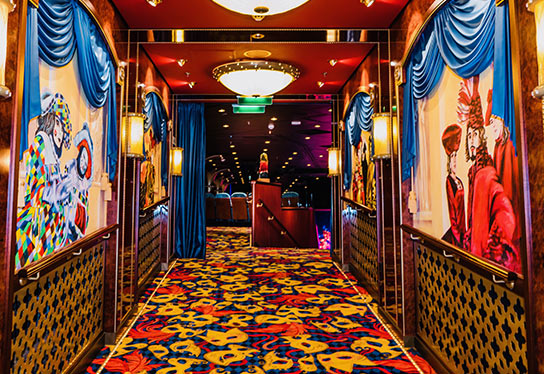 There’s also the occasional dud but I won’t go too much into that. It does happen, though.
There’s also the occasional dud but I won’t go too much into that. It does happen, though.
Most ships also have a production cast of singers and dancers. On my contracts so far, the cast generally has had 4 main production shows and 3 or 4ish other auxiliary pieces. Most or all are performed on a cruisely basis. Again, depending on the company or size of the ship, the band might play the production show or it could be put to prerecorded track. Currently, our band plays 2 of the main production shows and 3 of their 4 auxiliary pieces. We call these auxiliary pieces ‘bumpers’. There’s some lingo for ya.
We play in theater maybe 7 or 8 nights per cruise, but there is a bar we play each day and night. It’s called the Meridian Lounge. This is where we do our sets for cocktail hour in the early evening and our theme night/party band sets after the main show in the theater. Easy listening jazz, aka background music depending on how you look at it, is the name of the game for cocktail hour. I actually really enjoy this set for a few reasons. Mostly, I just like playing jazz standards. It's also a nice way learn new tunes and try different ideas in improvisation.
For our late night sets we preform a schmorgasboard of different themes. Some examples are Dancing Through the Decades, Stevie Wonder, Hits of Motown, Dixieland, Nothin’ but the Blues, and the band’s favorite, Latin Night. There was definitely a learning curve for me when I started playing some of these famous rock and motown tunes. I usually put most of my practice time into learning and practicing jazz music, but I learned pretty quickly there are just certain tunes, regardless of style, you just have to know. Take it from, but you never want to be ‘that guy’.
Our shows in the theater and Meridian Lounge are the main gigs, but our band also functions as the previously mentioned "holy crap we need musicians for this event let’s get the band!” band. The trumpet player isn’t usually needed for these special events, but it is not unusual that certain more critical members perform for a ceremony, group travel meeting, or private party. My only experience thus far in these extra events has been playing Taps for an Anzac Day Ceremony. Anzac Day is the Australian’s and New Zealander's version of Memorial or Veteran’s Day, originally celebrated to commemorate those 2 countrie's first engagement in World War 1. I was actually very honored to be a part of this ceremony - I think it meant a great deal to those present and I was happy to lend my skills for a short time.
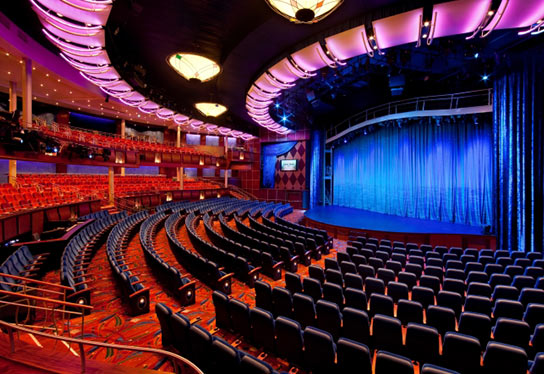 One interesting development on this contract has been the opportunity for me to play the piano. I did a few semesters of jazz piano in college and took lessons growing up, but I never really had played in an ensemble setting. Due to a scheduling conflict at the beginning of my contract, I got play one jazz set and since then, I’ve had the good fortune of playing a few different sets in a variety of settings. So far I’ve done jazz septet, quartet, and trios, duos with guitar and bass, as well 1 solo set. I’ve had my ‘even grandma could tell that wasn’t right’ moments, but I’ve been getting better and thankful for that unique opportunity.
One interesting development on this contract has been the opportunity for me to play the piano. I did a few semesters of jazz piano in college and took lessons growing up, but I never really had played in an ensemble setting. Due to a scheduling conflict at the beginning of my contract, I got play one jazz set and since then, I’ve had the good fortune of playing a few different sets in a variety of settings. So far I’ve done jazz septet, quartet, and trios, duos with guitar and bass, as well 1 solo set. I’ve had my ‘even grandma could tell that wasn’t right’ moments, but I’ve been getting better and thankful for that unique opportunity.
Another thing people are generally curious about is how I practice on board. I plan to write a separate, more detailed post about how I structure my practice time, but I’ll give a brief description here. The biggest thing I have discovered about onboard practicing is that I need to be creative and flexible. Because my schedule can change drastically each day and most spaces on board are shared, it is difficult to rely on a certain times of day and specific locations. Early mornings and late night are generally open, but even then it can challenging to find a space.
My usual practice rooms are the dressing rooms backstage or the storage wings on either side of the theater. I usually try to do 2-3 sessions a day, depending on my playing schedule and the availability of my usual rooms. Sometimes I’ll use a mute if I absolutely have to, but I try do it as little as possible. I’ve also had to develop a thick skin about my practicing. Because spaces are shared, sometimes it’s either I practice with people working and moving things around me or I don’t practice at all. I was sheepish at first but now it’s just part of the routine.
Because I know some of you are curious, I’ll say I generally play/work 2-3 hours per day. Days off are extremely rare, but they do occasionally happen. On the flip side, the most I’ve ever played in a single day has been upwards of 5 or 6 hours. That amount of playing is also rare. My schedule is pretty consistent day to day, but heavy playing and strings of heavy days are not out of the ordinary. That was a large adjustment for me when I started working on ships and forced me to rethink how I practice.
 If I’m trying to give a truly accurate description of my job, I also need to include my non-musical duties. My current duties include mandatory safety trainings and a role during our cruisely passenger drills and weekly crew drills. My current role during drill is to direct passengers to their seats in the unlikely case of an emergency. We practice this with passengers at the beginning of each cruise and for me, the most difficult part of this duty is not the actual directing of passengers, but using what our company calls 'premium language’. Tried and true classics such as ‘whats up man’, ‘umm, could you guys move over there’ and ‘hey folks!’ don’t really cut it.
If I’m trying to give a truly accurate description of my job, I also need to include my non-musical duties. My current duties include mandatory safety trainings and a role during our cruisely passenger drills and weekly crew drills. My current role during drill is to direct passengers to their seats in the unlikely case of an emergency. We practice this with passengers at the beginning of each cruise and for me, the most difficult part of this duty is not the actual directing of passengers, but using what our company calls 'premium language’. Tried and true classics such as ‘whats up man’, ‘umm, could you guys move over there’ and ‘hey folks!’ don’t really cut it.
I’m workin on em...
To bring it all back, the final question, why, doesn’t need much explanation. I work on cruise ships because I love playing music and traveling. Also, working on cruise ship is one of the rare salaried positions left for performing musicians. It seemed like a perfect fit when I was auditioning last May and still is 1 year later.
I hope I answered some questions that you might’ve had about my job on board as a trumpet player. If there is anything else you might’ve been wondering about or if something came to you while reading, please post it below or send me an email and I will get back to you as quickly as possible! My next post in this series will be about the unique type of traveling one does while working on a cruise ship. Thank you for reading and I hope you found this post informative and worthwhile. Until next time!
